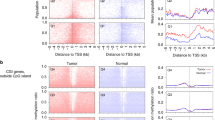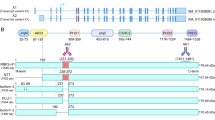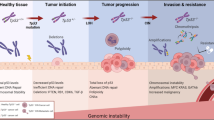Abstract
Epigenetic silencing of tumor suppressor gene promoters has become a more frequent phenomenon in cancer than previously anticipated. In this study we addressed the mechanisms involved in the protection of the p53 tumor suppressor gene against epigenetic silencing in human transformed cell lines. We characterized a binding site for the CCCTC-binding factor (CTCF) in the human p53 gene promoter that contributes to its transcriptional expression, and has the ability to maintain this regulatory element in a local open chromatin configuration. In the absence of CTCF we observe the incorporation of repressive histone marks, such as H3K9me3, H3K27me3 and H4K20me3, in different sub-domains of the upstream regulatory sequence. This evidence suggests that CTCF protects the p53 gene promoter against repressive histone marks. Notably, no apparent direct correlation between repression and DNA hypermethylation has been detected. Together, we present evidence supporting the relevant role of CTCF in the epigenetic regulation of tumor suppressor genes and cancer. We propose that CTCF is a strategic component responsible for the maintenance and segregation of epigenetic traits.
This is a preview of subscription content, access via your institution
Access options
Subscribe to this journal
Receive 50 print issues and online access
$259.00 per year
only $5.18 per issue
Buy this article
- Purchase on Springer Link
- Instant access to full article PDF
Prices may be subject to local taxes which are calculated during checkout






Similar content being viewed by others
References
Amatya VJ, Naumann U, Weller M, Ohgaki H . (2005). TP53 promoter methylation in human gliomas. Acta Neuropathol 110: 178–184.
Antequera F . (2003). Structure, function and evolution of CpG island promoters. Cell Mol Life Sci 60: 1647–1658.
Barski A, Cuddapah S, Cui K, Roh TY, Schones DE, Wang Z et al. (2007). High-resolution profiling of histone methylations in the human genome. Cell 129: 823–837.
Butcher DT, Rodenhiser DI . (2007). Epigenetic inactivation of BRCA1 is associated with aberrant expression of CTCF and DNA methyltransferase (DNMT3B) in some sporadic breast tumours. Eur J Cancer 43: 210–219.
Clark SJ, Statham A, Stirzaker C, Molloy PL, Frommer M . (2006). DNA methylation: bisulphite modification and analysis. Nat Protocols 1: 2353–2364.
De La Rosa-Velázquez IA, Rincón-Arano H, Benítez-Bribiesca L, Recillas-Targa F . (2007). Epigenetic regulation of the human retinoblastoma tumor suppressor gene promoter by CTCF. Cancer Res 67: 2577–2585.
Docquier F, Kita GX, Farrar D, Jat P, O'Hare M, Chernukhin I et al. (2009). Decreased poly(ADP-ribosyl)ation of CTCF, a transcription factor, is associated with breast cancer phenotype and cell proliferation. Clin Cancer Res 15: 5762–5771.
El-Kady A, Klenova E . (2005). Regulation of the transcription factor, CTCF, by phosphorylation with protein kinase CK2. FEBS Lett 579: 1424–1434.
Escamilla-Del-Arenal M, Recillas-Targa F . (2008). GATA-1 modulates the chromatin structure and activity of the chicken α-globin 3′ enhancer. Mol Cell Biol 28: 575–586.
Filippova G . (2008). Genetics and epigenetics of the multifunctional protein CTCF. Curr Top Dev Biol 80: 337–360.
Guelen L, Pagie L, Brasset E, Meuleman W, Faza MB, Talhout W et al. (2008). Domain organization of human chromosomes revealed by mapping of nuclear lamina interactions. Nature 453: 948–951.
Hong JA, Kang Y, Abdullaev Z, Flanagan PT, Pack SD, Fischette MR et al. (2005). Reciprocal binding of CTCF and BORIS to the NY-ESO-1 promoter coincides with derepression of this cancer-testis gene in lung cancer cells. Cancer Res 65: 7763–7774.
Ishihara K, Oshimura M, Nakao M . (2006). CTCF-dependent chromatin insulator is linked to epigenetic remodeling. Mol Cell 23: 733–742.
Irizarry RA, Ladd-Acosta C, Wen B, Wu Z, Montano C, Onyango P et al. (2009). The human colon cancer methylome shows similar hypo- and hypermethylation at conserved tissue-specific CpG island shores. Nat Genet 41: 178–186.
Issa J-P . (2004). CpG island methylator phenotype in cancer. Nat Rev Cancer 4: 988–993.
Jelinic P, Stehle JC, Shaw P . (2006). The testis-specific factor CTCFL cooperates with the protein methyltransferase PRMT7 in H19 imprinting control region methylation. PLoS Biol 4: e355.
Jones PA, Baylin SB . (2007). The epigenomics of cancer. Cell 128: 683–692.
Kang JH, Kim SJ, Noh DY, Park IA, Choe KJ, Yoo OJ et al. (2001). Methylation in the p53 promoter is a supplementary route to breast carcinogenesis: correlation between CpG methylation in the p53 promoter and the mutation of the p53 gene in the progression from ductal carcinoma in situ to invasive ductal carcinoma. Lab Invest 81: 573–579.
Kim TH, Abdullaev ZK, Smith AD, Ching KA, Loukinov DI, Green RD et al. (2007). Analysis of the vertebrate insulator protein CTCF-binding sites in the human genome. Cell 128: 1231–1245.
Klenova EM, Morse III HC, Ohlsson R, Lobanenkov VV . (2002). The novel BORIS+CTCF gene family is uniquely involved in the epigenetics of normal biology and cancer. Semin Cancer Biol 12: 399–414.
Kondo Y, Shen L, Cheng AS, Ahmed S, Boumber Y, Charo C et al. (2008). Gene silencing in cancer by histone H3 lysine 27 trimethylation independent of promoter DNA methylation. Nat Genet 40: 741–750.
Le MT, Teh C, Shyh-Chang N, Xie H, Zhou B, Korzh V et al. (2009). MicroRNA-125b is a novel negative regulator of p53. Genes Dev 23: 862–876.
Loukinov DI, Pugacheva E, Vatolin S, Pack SD, Moon H, Chernukhin I et al. (2002). BORIS, a novel male germ-line protein associated with epigenetic reprogramming events, shares the same 11-zinc-finger domain with CTCF, the insulator protein involved in reading imprinting marks in the soma. Proc Natl Acad Sci USA 99: 6806–6911.
Mahmoudi S, Henriksson S, Corcoran M, Méndez-Vidal C, Wiman KG, Farnebo M . (2009). Wrap53, a natural p53 antisense transcript required for p53 induction upon DNA damage. Mol Cell 33: 462–471.
McGarvey KM, Fahrner JA, Greene E, Martens J, Jenuwein T, Baylin SB . (2006). Silenced tumor suppressor genes reactivated by DNA demethylation do not return to a fully euchromatic chromatin state. Cancer Res 66: 3541–3549.
Meissner A, Mikkelsen TS, Gu H, Wernig M, Hanna J, Sivachenko A et al. (2008). Genome-scale DNA methylation maps of pluripotent and differentiated cells. Nature 454: 766–770.
Nguyen P, Cui H, Bisht KS, Sun L, Patel K, Lee RS et al. (2008). CTCFL/BORIS is a methylation-independent DNA-binding protein that preferentially binds to the paternal H19 differentially methylated region. Cancer Res 68: 5546–5551.
Pogribny IP, Pogribna M, Christman JK, James SJ . (2000). Single-site methylation within the p53 promoter region reduces gene expression in a reporter gene construct: possible in vivo relevance during tumorigenesis. Cancer Res 60: 588–594.
Recillas-Targa F, De La Rosa-Velázquez IA, Soto-Reyes E, Benítez-Bribiesca L . (2006). Epigenetic boundaries of tumour suppressor gene promoters: the CTCF connection and its role in carcinogenesis. J Cell Mol Med 10: 554–568.
Sawado T, Igarashi K, Groudine M . (2001). Activation of β-major globin gene transcription is associated with recruitment of NF-E2 to the β-globin LCR and gene promoter. Proc Natl Acad Sci USA 98: 10226–10231.
Schreiber E, Matthias P, Müller MM, Schaffner W . (1989). Rapid detection of octamer binding proteins with ‘mini extracts’, prepared from a small number of cells. Nucl Acids Res 17: 6419.
Schotta G, Lachner M, Sarma K, Ebert A, Sengupta R, Reuter G et al. (2004). A silencing pathway to induce H3-K9 and H4-K20 trimethylation at constitutive heterochromatin. Genes Dev 18: 1251–1262.
Su CH, Shann YJ, Hsu MT . (2009). p53 chromatin epigenetic domain organization and p53 transcription. Mol Cell Biol 29: 93–103.
Sun L, Huang L, Nguyen P, Bisht KS, Bar-Sela G, Ho AS et al. (2008). DNA methyltransferase 1 and 3B activate BAG-1 expression via recruitment of CTCFL/BORIS and modulation of promoter histone methylation. Cancer Res 68: 2726–2735.
Valadez-Graham V, Razin SV, Recillas-Targa F . (2004). CTCF-dependent enhancer blockers at the upstream region of the chicken α-globin gene domain. Nucleic Acids Res 32: 1354–1362.
Vazquez A, Bond EE, Levine AJ, Bond GL . (2008). The genetics of the p53 pathway, apoptosis and cancer therapy. Nat Rev Drug Discov 7: 979–987.
Vousden KH, Prives C . (2009). Blinded by the light: the growing complexity of p53. Cell 137: 413–431.
Yu W, Ginjala V, Pant V, Chernukhin I, Whitehead J, Docquier F et al. (2004). Poly(ADP-ribosyl)ation regulates CTCF-dependent chromatin insulation. Nat Genet 36: 1105–1110.
Weber M, Hellmann I, Stadler MB, Ramos L, Pääbo S, Rebhan M et al. (2007). Distribution, silencing potential and evolutionary impact of promoter DNA methylation in the human genome. Nat Genet 39: 457–466.
Williams A, Flavell RA . (2008). The role of CTCF in regulating nuclear organization. J Exp Med 205: 747–750.
Witcher M, Emerson BM . (2009). Epigenetic silencing of the p16INK4a tumor suppressor is associated with loss of CTCF binding and a chromatin boundary. Mol Cell 34: 271–284.
Acknowledgements
We thank Inti Alberto de la Rosa-Velázquez, Catherine Farrell, Mayra Furlan-Magaril, Francisco Antequera, Abrahan Hernández-Hernández, Martín Escamilla-del-Arenal and Héctor Rincón-Arano for suggestions and constant scientific discussions. We are particularly indebted with the excellent technical assistance of Georgina Guerrero Avendaño, members of the Félix Recillas-Targa laboratory, Dr JA García-Saínz and the Instituto de Fisiología Celular, UNAM. We thank L Ongay, G Codiz and M Mora from the Unidad de Biología Molecular, IFC-UNAM, for DNA sequencing. This work was supported by the Dirección General de Asuntos del Personal Académico-Universidad Nacional Autónoma de México (IN209403 and IN214407), Consejo Nacional de Ciencia y Tecnología (CONACyT: 42653-Q and 58767) and Fundación Miguel Alemán, AC. E Soto-Reyes is supported by a PhD fellowship from CONACyT (181389) and Dirección General de estudios de Posgrado-Universidad Nacional Autónoma de México (DGEP). Additional support was provided by the PhD Graduate Program of Doctorado en Ciencias Biomédicas.
Author information
Authors and Affiliations
Corresponding author
Ethics declarations
Competing interests
The authors declare no conflict of interest.
Additional information
Supplementary Information accompanies the paper on the Oncogene website
Rights and permissions
About this article
Cite this article
Soto-Reyes, E., Recillas-Targa, F. Epigenetic regulation of the human p53 gene promoter by the CTCF transcription factor in transformed cell lines. Oncogene 29, 2217–2227 (2010). https://doi.org/10.1038/onc.2009.509
Received:
Revised:
Accepted:
Published:
Issue Date:
DOI: https://doi.org/10.1038/onc.2009.509
Keywords
This article is cited by
-
Differential DNA methylation and CTCF binding between the ESR1 promoter a of MCF-7 and MDA-MB-231 breast cancer cells
Molecular Biology Reports (2024)
-
Epigenetic regulation of TP53 is involved in prostate cancer radioresistance and DNA damage response signaling
Signal Transduction and Targeted Therapy (2023)
-
Survival is associated with repressive histone trimethylation markers in both HR-positive HER2-negative and triple-negative breast cancer patients
Virchows Archiv (2023)
-
CTCF loss mediates unique DNA hypermethylation landscapes in human cancers
Clinical Epigenetics (2020)
-
NPM1c impedes CTCF functions through cytoplasmic mislocalization in acute myeloid leukemia
Leukemia (2020)



